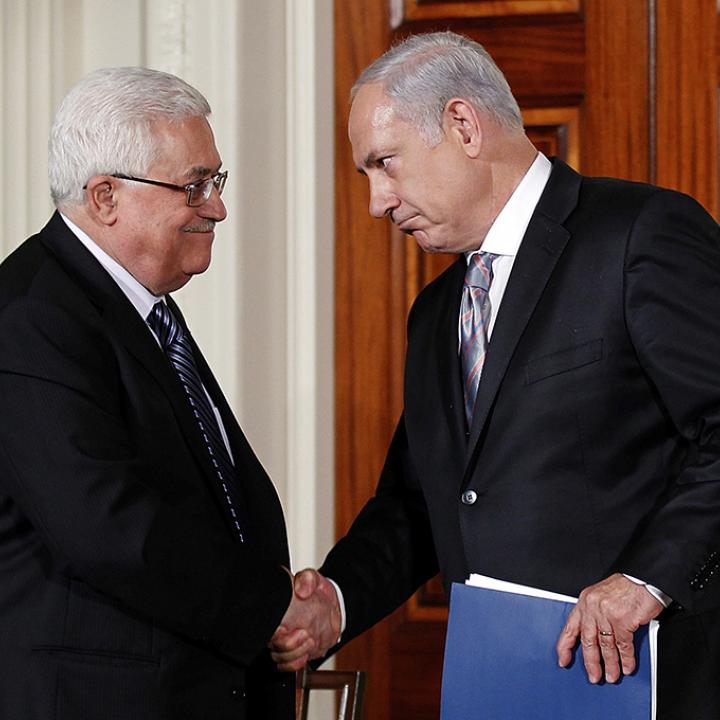
- Policy Analysis
- Articles & Op-Eds
International Peace Conference: Winners and Losers

The United States, the United Nations, and other Western capitals have widely acknowledged the unlikely prospects for Palestinian-Israeli peace in the near future. This is notably due to the variety of obstacles, mostly from the Israeli side, against internationally brokered negotiations. Nevertheless, France has insisted on holding an international peace conference. The impetus for the conference has apparently been to serve France’s own interests and in response to Palestinian and Arab pressure towards France. This is perhaps one of the explanations for why the French are attempting this effort, even as they are aware that any progress in the peace process is a long shot given the lack of real desire for engagement on either side.
U.S. President Barack Obama has already announced that an Israeli-Palestinian peace agreement was no longer expected to occur during his presidency, a statement that Vice President Joe Biden reiterated. And Washington has since voiced opposition to the French proposal to present a political initiative on the Palestinian issue to the Security Council. The U.S. government has two reasons for opposing the move that it finds particularly compelling.
First, the conference does not have the proper international conditions required to yield positive results worth celebrating. Second, France imposed a precondition to negotiations by threatening to recognize the State of Palestine were their initiative to fail, which the U.S. government considers unacceptable.
Israel’s response to the proposed initiative has been even more vehemently opposed than that of the United States. It has placed a slew of obstacles in the way of French efforts by accusing France of being anti-Israel and showing an obvious tilt toward the Palestinian side. Israel believes that France’s threat of unilateral recognition of the state of Palestine allows Palestinians to hold on obstinately to a set negotiating position without room to maneuver into a view more consistent with Israeli negotiations requirements. Consequently, Israel promised to fight and abolish this initiative, and officially rejected it on April 28. In light of Israel’s hard-line position against the conference, France was forced to withdraw and abstain from discussing the initiative for a period of time. At this point, Israeli Prime Minister Benjamin Netanyahu stated that the French initiative no longer existed.
Yet French discussion of the conference—reportedly slated for May 30—has reappeared, albeit in a different form. Now, both French behavior and tone have changed. In fact, France has made drastic alterations to the initiative, focusing on incentives to gain Israeli acceptance for the program and prioritizing the mobilization of both sides for the anticipated peace conference.
In light of the reductions and modifications made by France, the chances of Israel’s participation in the conference have increased along with the country’s potential gains. Regardless of discussions stipulating that the decisions of the Conference will be binding to all sides, Israel seems now slated to see gains even if decisions made during the conference contradict Israel’s interests in part or even totally.
In this adjusted peace initiative, one of the most substantial Israeli gains has been France’s removal of their major precondition: recognition of the State of Palestine in the event the initiative fails. This shift in stance has been coupled by French guarantees that the French state understands Israeli needs, and that they are taking into account Israeli doubts that Palestinian President Mahmoud Abbas would be willing to make any valuable compromises or even effectively represent the Palestinians, despite the notable lack of more credible alternatives.
Moreover, European positions have promised to exhibit more leniency toward Israel after their previously harsh and critical positions of Israel’s hard-line stances towards final status issues, settlements, and general practices during the occupation. Moreover, approving the initiative has left many Palestinians concerned that Israel may use this period to seize as much Palestinian territory as possible through settlements to further renegotiate the final borders later.
The Palestinian Authority (PA) has also offered concessions as part of this initiative under U.S. and European pressure, on the pretext that not doing so would cause tension and affect the French initiative. The PA has agreed to halt its efforts in presenting a draft resolution against settlements to the Security Council and freeze any draft resolutions against Israel with the UN. It has also suspended any mention of ceasing security coordination with Israel.
Nevertheless, it is unclear if French and Palestinian concessions are enough to bring Netanyahu to the negotiating table, since Netanyahu appear to continue to insist that while “Israel is ready immediately to begin direct negotiations with the Palestinians… Any other diplomatic initiative distances the Palestinians from the table of direct negotiations.” Ultimately, even if the conference is held on time and all participants discuss one option only—a comprehensive peace agreement based on the two-state solution—Netanyahu’s current trepidation and the current Israeli mood might indicate that Israelis (as a whole) would be unwilling to fully commit to French-brokered negotiations in a manner that is consistent with the vision and understanding of its international participants. For now, the building tensions in the region have left a significant section of Israeli society more concerned with achieving gains and retribution than another jab at the peace process.
Dr. Adel Mohammed Ayesh Al-Astel is a Palestinian academic. This item was originally published on the Fikra website.
Fikra Forum


